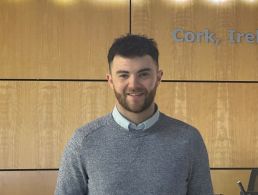Rachel Callaghan discusses what she learned from her software engineering internship with Verizon Media, despite the impacts of a global pandemic.
When the Covid-19 pandemic hit, computing and software development student Rachel Callaghan was three months into her internship at Verizon Media.
Here, she talks about a typical day in her front-end development role and why her soft skills were “amplified” when she started working from home.
‘Communication was three times as important since everyone was in their own different routine’
– RACHEL CALLAGHAN
What drew you to Verizon Media when you were seeking an internship?
As part of our work placement module, we were to research different companies and compose a list of places we would be interested in doing our internship with. One thing that caught my eye about Verizon Media was the video that they had previous interns do.
They talked about what it was like to work there and their experience. Ask me what they said now and I couldn’t tell you, though I remember they talked about how practical their learning was. As someone who likes to ‘do’ to learn, I felt it would be a good place to work.
What expectations did you have before you began your internship?
I honestly wasn’t sure what to expect. I had asked at the end of my interview: ‘If I was hired, what kinds of languages and frameworks would I be expected to use?’.
Other than that, I wholly had no idea. I expected that I would learn a lot, but I think that was a given.
What duties and responsibilities were you given initially?
Myself and the other interns started a group project at the very beginning. We were told what the project was and then it was up to us to design, build and manage the process ourselves.
On the team I was with for the majority of the internship, I focused on smaller front-end stories to get used to the language (which I had not used in depth before) and to get familiar with the project itself, and all that entailed.
Did the scope of your work change as the internship progressed?
Yes. Funnily enough, I had actually interviewed for more of a back-end role, but when I joined the team it was quickly realised that there was more front-end work to be done.
For a large majority of the internship I focused on front-end; my tickets becoming more and more complex as I got better. Towards the end of my internship, I was given some API work. It was more difficult to get the hang of, since I was working from home, but it was interesting nonetheless.
Can you describe a typical day in your role?
My commute would have been an hour pre-Covid. I would get in, go for breakfast and play some cards before the workday started. At about nine, I’d start the day. I checked the calendar to see if there were any meetings outside the norm and then either continue what I was working on the day before or pick up a new story.
Lunch was at 12, with food provided in the canteen. There were some restaurant options around our building either, or a short Luas ride away. Scrum was at two o’clock every day, with ‘retro’ and planning every two weeks, on Monday and Tuesday respectively. The day would then continue as it began, with some coffee breaks or short strolls to refocus if needed.
Covid didn’t particularly change up the routine too much. I could get up later, we moved playing cards to the online app for a while (but it just wasn’t the same, so we stopped) and I still kept my working routine the same. Though the days felt longer since there wasn’t much social interaction outside of meetings.
What key things have you learned during your internship?
I think my biggest take away from the internship was the importance of good-quality code and optimising as much as possible. I had tried my best to do this in college anyway, but working on repositories with as many people as I was, it was important to keep the code as clean as possible and have it function as well as possible.
Of course, I learned more advanced coding techniques. But I don’t think I would have developed an eye for quality code unless I worked with a team that prioritised it as much as mine did.
Covid, of course, impacted my internship as well. After two or three months of working in the office, I was sent to work from home. Silver linings though, because any soft skill that I had been developing in the office was amplified when I started working from home.
Communication was three times as important since everyone was in their own different routine. Some would be stuck in their work and not notice your notification, some were in meetings you didn’t know about and so on.
Self-motivation was a big thing as well. The office is a place made for working, so you get in the swing of it faster. My bedroom though? Made for sleeping. The office vibe was not there to bounce off, so I had to find my own ways of motivating myself.
Has your internship made you feel as though you’re on the right career path?
I won’t lie, after the work-from-home order, I was overwhelmed for some time and questioned if I wanted this for my career path. The balance of work and life was heavily skewed and I felt as if I was just constantly working and nothing else. Though I don’t think that was any issue with actually working, but one of the world’s events.
Covid-living became the new normal, and thus I fell into my routine easier. I began to really like working from home too. Regardless of the crazy year, I feel comfortable with software engineering as my career.
Do you feel more prepared for working life following your internship?
Yes, I think I got a very unique experience from my internship. Office culture, I believe, is changing. Working from home will become more of a norm than it was. I got to directly experience the shift and am more prepared for it, I think, as well as everything that goes along with it.
Also, getting practical experience has made me feel more like a developer rather than just a student. It’s given me the confidence that my skills are more than enough to get me through and even if I’m lacking in any given area, I know I can figure a lot out myself. And I know I can rely on others to help as well.
Why should someone take up an internship at Verizon Media?
Verizon Media staff, not just fellow developers, are so kind and helpful. You’ll not struggle to get the help you need and you will learn a lot from everybody. I’ve had times when I’d reach out to ask a question, unknowing that they were preoccupied, only for them to arrange help from somebody else for me.
Everybody that I talked to was more than willing to share what they knew, even if they said it wasn’t a lot (even though it usually was). The practical knowledge is just a small aspect of what you learn here. I would more than recommend it to anybody.




